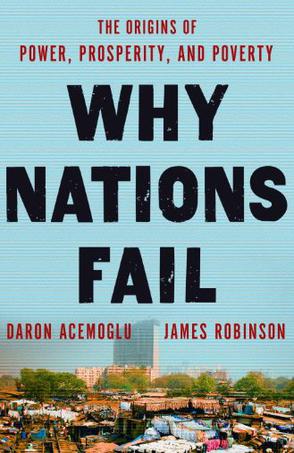
章节目录
Contents Preface Why Egyptians filled Tahrir Square to bring down Hosni Mubarak and what it means for our understanding of the causes of prosperity and poverty 1. So Close and Yet So Different Nogales, Arizona, and Nogales, Sonora, have the same people, culture, and geography. Why is one rich and one poor? 2. Theories That Don't Work Poor countries are poor not because of their geographies or cultures, or because their leaders do not know which policies will enrich their citizens 3. The Making of Prosperity and Poverty How prosperity and poverty are determined by the incentives created by institutions, and how politics determines what institutions a nation has 4. Small Differences and Critical Junctures: The Weight of History How institutions change through political conflict and how the past shapes the present 5. "I've Seen the Future, and It Works": Growth Under Extractive Institutions What Stalin, King Shyaam, the Neolithic Revolution, and the Maya city-states all had in common and how this explains why China?s current economic growth cannot last 6. Drifting Apart How institutions evolve over time, often slowly drifting apart 7. The Turning Point How a political revolution in 1688 changed institutions in England and led to the Industrial Revolution 8. Not on Our Turf: Barriers to Development Why the politically powerful in many nations opposed the Industrial Revolution 9. Reversing Development How European colonialism impoverished large parts of the world 10. The Diffusion of Prosperity How some parts of the world took different paths to prosperity from that of Britain 11. The Virtuous Circle How institutions that encourage prosperity create positive feedback loops that prevent the efforts by elites to undermine them 12. The Vicious Circle How institutions that create poverty generate negative feedback loops and endure 13. Why Nations Fail Today Institutions, institutions, institutions 14. Breaking the Mold How a few countries changed their economic trajectory by changing their institutions 15. Understanding Prosperity and Poverty How the world could have been different and how understanding this can explain why most attempts to combat poverty have failed Acknowledgments Bibliographical Essay and Sources References Index
内容简介
Review "'You will have three reasons to love this book. It's about national income differences within the modern world, perhaps the biggest problem facing the world today. It's peppered with fascinating stories that will make you a spellbinder at cocktail parties - such as why Botswana is prospering and Sierra Leone isn't. And it's a great read. Like me, you may succumb to reading it in one go, and then you may come back to it again and again.' (Jared Diamond, Pulitzer-prize-winning author of bestselling books including 'Guns, Germs, and Steel' and 'Collapse')" ~~~~~~~~~~~~~~~~~~~~~~~~~~~~~~~~~~ Product Description This is a provocative new theory of political economy explaining why the world is divided into nations with wildly differing levels of prosperity. Why are some nations more prosperous than others? "Why Nations Fail" sets out to answer this question, with a compelling and elegantly argued new theory: that it is not down to climate, geography or culture, but because of institutions. Drawing on an extraordinary range of contemporary and historical examples, from ancient Rome through the Tudors to modern-day China, leading academics Daron Acemoglu and James A. Robinson show that to invest and prosper, people need to know that if they work hard, they can make money and actually keep it - and this means sound institutions that allow virtuous circles of innovation, expansion and peace. Based on fifteen years of research, and answering the competing arguments of authors ranging from Max Weber to Jeffrey Sachs and Jared Diamond, Acemoglu and Robinson step boldly into the territory of Francis Fukuyama and Ian Morris. They blend economics, politics, history and current affairs to provide a new, powerful and persuasive way of understanding wealth and poverty. They offer a pragmatic basis for the hope that at 'critical junctures' in history, those mired in poverty can be placed on the path to prosperity - with important consequences for our views on everything from the role of aid to the future of China.
下载说明
1、Why Nations Fail是作者Daron Acemoglu,James创作的原创作品,下载链接均为网友上传的网盘链接!
2、相识电子书提供优质免费的txt、pdf等下载链接,所有电子书均为完整版!
